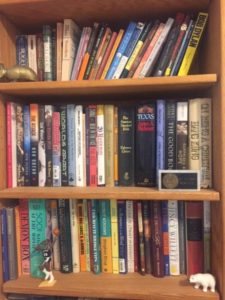
Photo by me
I fought the good fight. One of the reasons I wrote my first novel, The Whole Nine Yards, was because I wanted to write something that a boy in high school might like. (I later learned that the real market for Young Adult is junior high/middle school, but that’s another story.) In my creative writing class, one of my exercises was a reading autobiography, i.e., how books had affected your life. Some of my students had a hard time with that one.
I feel bad for kids who don’t read the same way I feel bad for kids who say they don’t dream. They are passing up free life. Experience without consequences. I tried to tell them—readers don’t get bored, readers aren’t dependent on others for entertainment, readers can travel through time, readers have healthy brains. Mostly I would get back vacant stares. I’m reminded of one boy in my classroom, years ago, who responded to my declaration that reading was fun as follows? “It can’t be fun. When you read, you have to think.”
I can remember my mother loading all of us kids into the car and taking us to the Upper Darby public library. It looked like a big white house and it sat up on a hill surrounded by trees. It had two stories and on the upstairs floor there were long aisles of books with white radiators at the end of certain aisles. I used to take my book and sit down near a radiator because I like how it smelled.
When my sister Diana was five, she memorized the children’s book Madeline.
“In an old house in Paris all covered with vines
Lived twelve little children in two straight lines.
In two straight lines they broke their bread,
Brushed their teeth and went to bed.”
She used to go up and down the street knocking on doors, offering to recite it for twenty-five cents. She was getting rich! It killed me because I could recite the whole damn thing too, but nobody thought it was cute when a ten-year-old boy did it. Not cute enough to pay for.
I know that I was a young reader because I’m sure I read the entire Hardy Boys series. After that it was the Chip Hilton series. Might have slipped a few Nancy Drew in between. But my turning point came at the end of fifth grade when my teacher sent home a note that said “Dallin is a very slow reader.” My father decided I needed to read a book a week all summer to improve my reading skills. The first book was The Earth is the Lord’s, and it was thicker than my fist. It was a fictionalized account of the boyhood of Genghis Khan, and I was hooked after 50 pages. I finished that one with a flashlight. I don’t remember the order, but Beau Geste and Boon Island and A Prisoner of Zenda came after that, and I became a life-long reader.
I read The Hobbit and The Lord of the Rings trilogy when I was seventeen. The first time I read them, it took about six days. My world ceased to exist—there was only Middle Earth. When Gandalf died, part of me went with him, and I still think his resurrection played a role in my becoming a Christian. I read them two more times before I turned twenty, and then I vowed not to read them again for twenty years. I read each book in the trilogy just before Peter Jackson’s film version was released, and they were just as good as I remembered. (His films were good, too.)
We did another exercise in Creative Writing where we had to come up with things we’d be willing to fight for. I’d fight for the right to read. In fact, I have. In the seventh grade, I discovered Ian Fleming’s James Bond series. Books got passed around a lot in my family, and my sister Miriam had his latest, For Your Eyes Only. I snuck into her bedroom one night and took it off her bed stand. The next day she caught me with it. Ugly words were exchanged, and we ended up in a tug-of-war, book in the middle. I had my legs spread, both hands on the book, leaning away from her. Bam! She racked me. Her leg shot through the air, and I went down like a gunshot. She walked back upstairs with her book as I lay writhing in agony. I suspect James would have handled it differently.
Leave a Reply